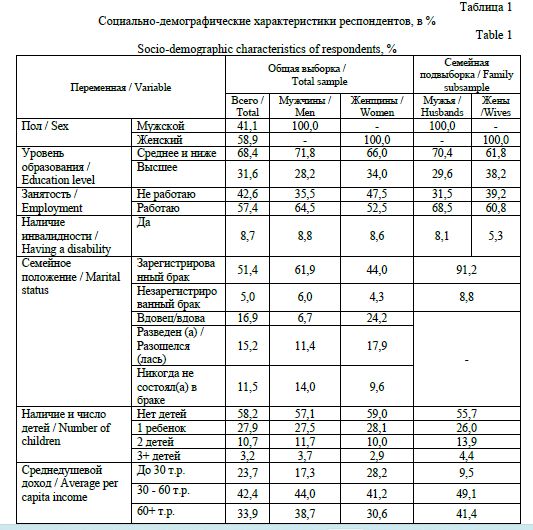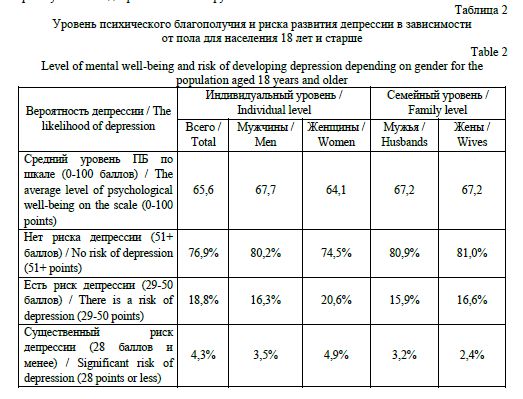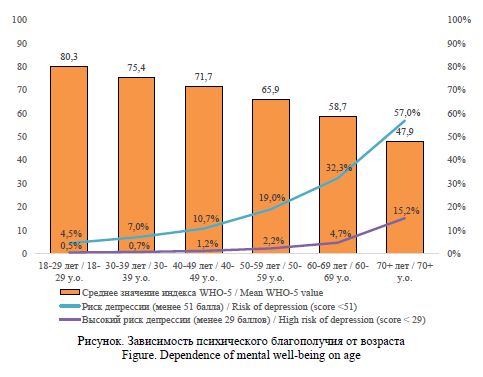Factors of subjective well-being of spouses:
sociological analysis
This article is dedicated to the study of factors influencing individuals' subjective well-being in post-industrial society, characterized by high levels of stress across various aspects of life. The exacerbation of mental health issues, caused by the COVID-19 pandemic, highlighted the need to develop effective methods for monitoring emotional and mental well-being to prevent negative outcomes. The empirical basis of the research is data from the Health Status Survey, conducted by Rosstat in 2023. An adapted version of the WHO-5 subjective well-being scale was used in the survey. Data analysis was performed using descriptive statistics and multivariate regression analysis, which helped identify key factors affecting respondents' mental well-being: age, gender, employment, education, children, disability, and place of residence. It was found that women and older individuals are at a higher risk of mental health deterioration, including depression. At the same time, stable employment, higher education, living in rural areas, and the absence of disability positively affect respondents' mental well-being. A distinctive feature of this work is that the study of subjective well-being among men and women is conducted not only at the individual level but also at the family level. Gender differences in the determinants of well-being were identified: the employment and education of the husband have a significant impact on the mental well-being of the wife, while similar characteristics of the wife do not notably affect the husband's well-being. Moreover, a registered marriage has a positive impact on the subjective well-being of wives. The authors emphasize the importance of a systematic approach in developing psychological support measures for families and call for particular attention to be paid to socially vulnerable groups to prevent the risk of depression and minimize its consequences.
Figures






Karpova, V. M., Lyalikova, S. V., Antonov, A. I. (2025), “Factors of subjective well-being of spouses: sociological analysis”, Research Result. Sociology and Management, 11 (2), 102-119, DOI: 10.18413/2408-9338-2025-11-2-0-7.


















While nobody left any comments to this publication.
You can be first.
Avdeev, E. A., Allardt, E., Belyaeva, L. A. et al. (2021), Sotsiologicheskie podkhody k izucheniyu sotsialnogo blagopoluchiya [Sociological approaches to the study of social well-being], ed. by M.F. Chernysh, Yu.B. Epikhina, FNISC RAS, Moscow, DOI: 10.19181/monogr.978-5-89697-377-5.2021, ISBN: 978-5-89697-377-5, EDN: LHJSQX. (In Russian)
Antipina, O. N., Khomutov, A. A. (2024), “How does life satisfaction depend on the type of settlement?”, Voprosy teoreticheskoy ekonomiki, (2), 103-115, DOI: 10.52342/2587-7666VTE_2024_2_103_115, EDN: DSNLEU. (In Russian)
Grigorova, Yu. B. (2019), “The Structure of Emotional Well-being”, ANI: pedagogika i psikhologiya, 1(26), 331-334, DOI: 10.26140/anip-2019-0801-0082, EDN: ZAAJBR. (In Russian)
Dubrovina, I. V. (2020), “The Phenomenon of “Psychological Well-Being” in the Context of the Social Situation of Development”, Vestnik prakticheskoy psikhologii obrazovaniya, 17 (3), 9-21, EDN: YHWSRSю. (In Russian)
Nazarova, I. B. (2023), “Determinants of Subjective Dissatisfaction with Life: Analysis of Russian Data for 1994-2021”, Monitoring obshhestvennogo mneniya: ekonomicheskie i sotsialnye peremeny, (6), 3-16, DOI: 10.14515/monitoring.2023.6.2433, EDN: YQRIABю. (In Russian)
Orlova, D.G. (2015), “Psychological and Subjective Well-being: Definition, Structure, Research (Review of Modern Sources)”, Vestnik Permskogo gosudarstvennogo gumanitarno-pedagogicheskogo universiteta. Seriya № 1. Psikhologicheskie i pedagogicheskie nauki, (1), 28-36, EDN: ULXSTX. (In Russian)
Savenysheva, S. S., Golovey, L. A., Petrash, M. D., Strizhitskaya, O. Yu. (2019), “Self-actualization, Psychological Well-being, and Everyday Stress in Adulthood”, Vestnik Kemerovskogo gosudarstvennogo universiteta, 21(1), 130-140, DOI: 10.21603/2078-8975-2019-21-1-130-140, EDN: VTIVCJ. (In Russian)
Skorynin, A. A. (2020), “On the Structure of Psychological Well-Being of an Individual”, Gumanitarnye issledovanija. Pedagogika i psihologija, (2), 87-93, DOI: 10.24411/2712-827X-2020-10210, EDN: NEUYQO. (In Russian)
Uvarov, D. Yu. (2007), Sotsialno-gigienicheskaya kharakteristika psikhicheskogo zdorovya bezrabotnyh (na primere Khabarovskogo kraya) [Socio-hygienic characteristics of the mental health of the unemployed (using the Khabarovsk Territory as an example)], Abstract of Cand. Sci. (Medicine), Khabarovsk, Russian Federation, EDN: NPSQIT. (In Russian)
Ahrendt, D., Mascherini, M., Nivakoski, S. and Sandor, E. (2021), “Living, working and covid-19 (Update April 2021): mental health and trust decline across EU as pandemic enters another year”, Eurofound, Publications Office of the European Union, Luxembourg, DOI: 10.2806/76802.
Atherton, O. E., Willroth, E. C., Graham, E. K., Luo, J., Mroczek, D. K. and Lewis-Thames, M. W. (2024), “Rural-urban differences in personality traits and well-being in adulthood”, Journal of personality, 92 (1), 73-87, DOI:10.1111/jopy.12818.
Baldwin, D., Sinclair, J. and Simons, G. (2021), “What is mental wellbeing?”, BJPsych Open, (7(S1)), 236-236, DOI:10.1192/bjo.2021.631.
Bech, P. (1993), Rating Scales for Psychopathology. Health Status and Quality of Life. A Compendium on Documentation in Accordance with the DSM-III-R and WHO Systems, Berlin, Springer.
Bech, P. (2004), “Measuring the dimensions of psychological general well-being by the WHO-5”, QoL Newslett, (32), 15-16.
Bech, P., Olsen, L., Kjoller, M. and Rasmussen, N. (2003), “Measuring well-being rather than the absence of distress symptoms: A comparison of the SF-36 mental health subscale and the WHO-Five well-being scale”, International Journal of Methods in Psychiatric Research, 12 (2), 85-91.
Delaney, L., Doyle, O., Mckenzie, K. and Wall, P. (2009), “The distribution of wellbeing in Ireland”, Irish Journal of Psychological Medicine, 26 (3), 119-126.
Galderisi, S., Heinz, A., Kastrup, M., Beezhold, J., Sartorius, N. (2015), “Toward a new definition of mental health”, World psychiatry: official journal of the World Psychiatric Association (WPA), 14 (2), 231-233, DOI: 10.1002/wps.20231.
Hajos, T. R., Pouwer, F., Skovlund, S. E., et al. (2013), “Psychometric and screening properties of the WHO-5 well-being index in adult outpatients with type 1 or type 2 diabetes mellitus”, Diabet Med, (30), 63-69.
Ismail, F., Lange, K., Gillig, M., Zinken, K., Schwabe, L., Stiesch, M. and Eisenburger, M. (2017), “WHO-5 well-being index as screening instrument for psychological comorbidity in patients with temporomandibular disorder”, CRANIO, 36 (3), 189-194, DOI: 10.1080/08869634.2017.1317900.
Löwe, B., Spitzer, R. L., Gräfe, K., Kroenke, K., Quenter, A., Zipfel, S., Buchholz, C., Witte, S. and Herzog, W. (2004), “Comparative validity of three screening questionnaires for DSM-IV depressive disorders and physicians’ diagnoses”, J Affect Disord, 78 (2), 131-140, DOI: 10.1016/s0165-0327(02)00237-9.
Rosenthal, L., Carroll-Scott, A., Earnshaw, V. A., Santilli, A. and Ickovics, J. R. (2012), “The importance of full-time work for urban adults' mental and physical health”, Soc. Sci. Med, 75 (9), 1692-1696.
Seb-Akahomen, O. J., Okogbenin, E. O., Obagaye, O. M., Erohubie, P. O., & Aweh, B. E. (2022), “The Reliability and Validity of the 5-Item Who Well-Being Index (WHO-5) amongst Doctors and Nurses in Nigeria”, West African journal of medicine, 39 (7), 708-713.
Topp, C. W., Østergaard, S. D., Søndergaard, S. and Bech, P. (2015), “The WHO-5 Well-Being Index: A Systematic Review of the Literature”, Psychother Psychosom, 84 (3), 167-176, DOI: 10.1159/000376585.
Ware, J. E. (1995), “The status of health assessment”, Annu Rev Public Health, (16), 327-354. DOI: 10.1146/annurev.pu.16.050195.001551.
Zweig, J. S. (2015), “Are Women Happier than Men? Evidence from the Gallup World Poll”, Journal of Happiness Studies, (16), 515-541.
The study was carried out with the financial support of the Russian Science Foundation (RSF) within the framework of scientific project №23-28-00942 “Emotional health Russian residents (state and dynamics over 26 years)”.